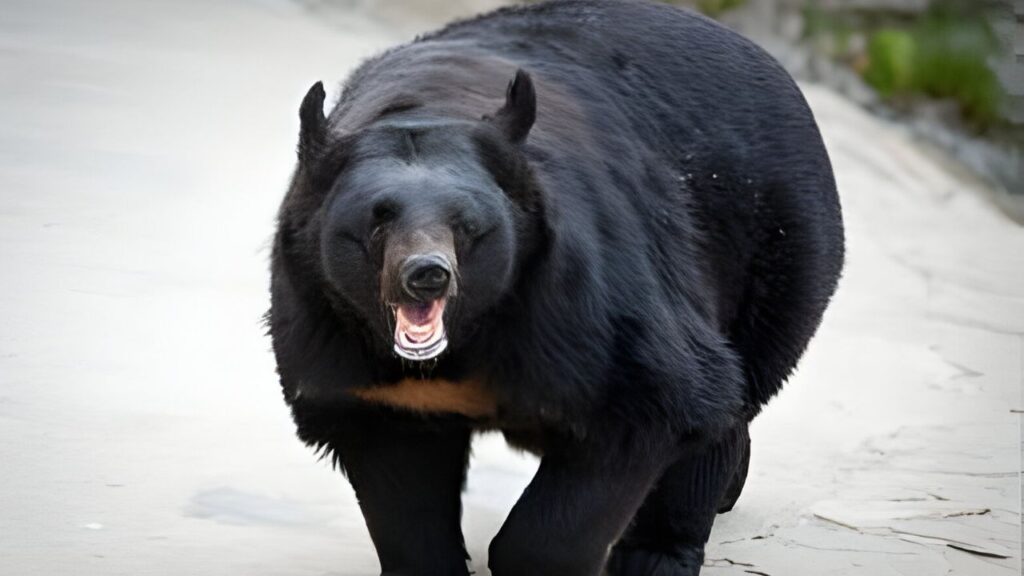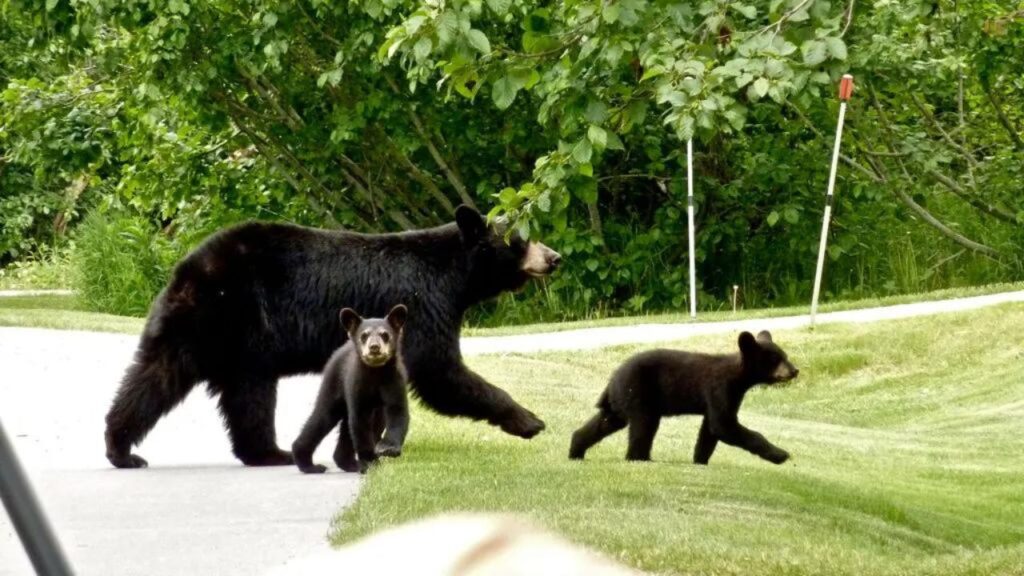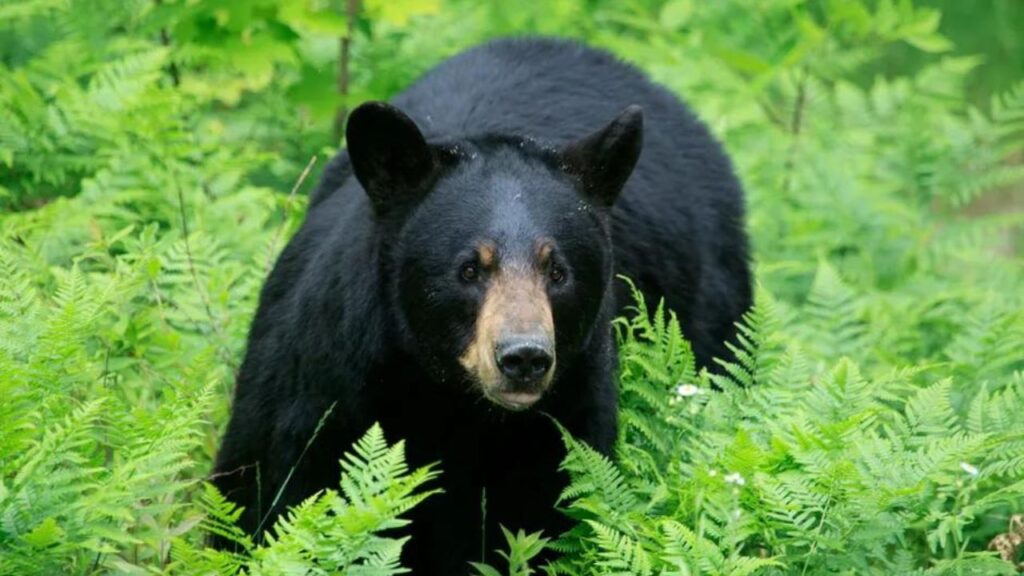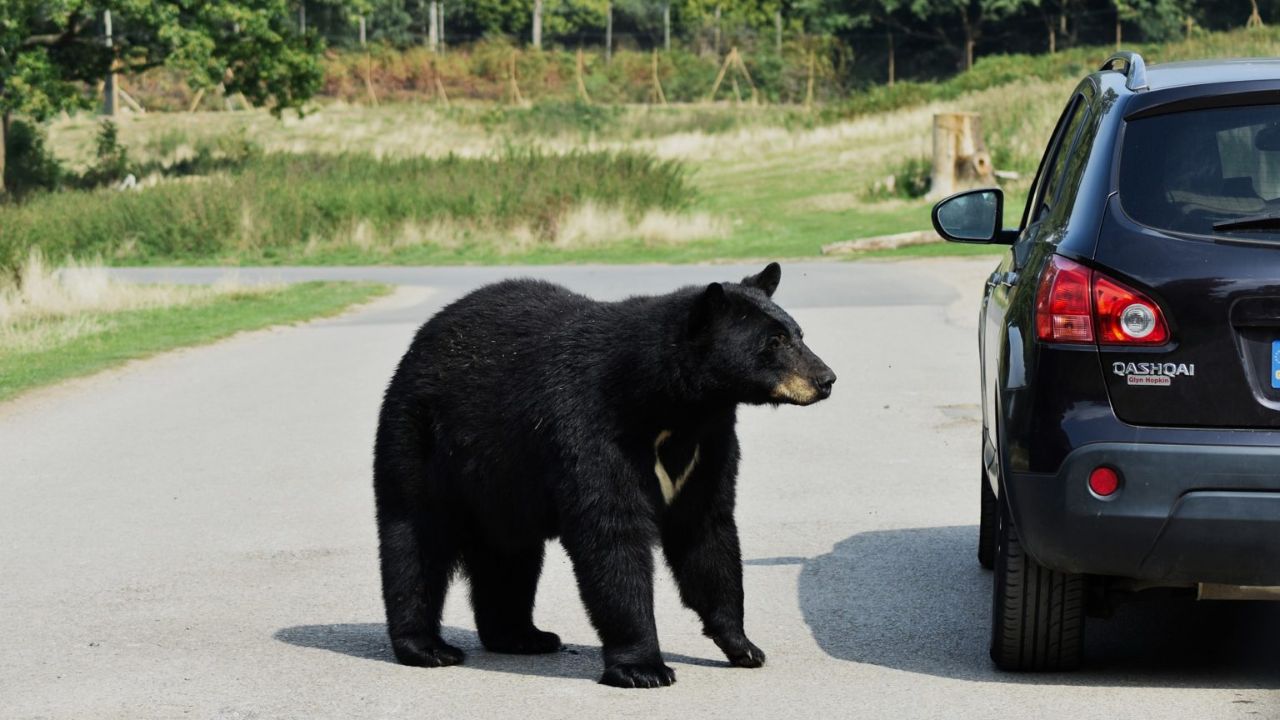Do Black Bears Attack Humans? Black bears rarely attack humans, with most incidents being defensive reactions when bears feel threatened or startled.
Black bears are one of the most common bear species in North America, often found in forests, mountains, and even near human habitats.
Understanding their behavior and potential danger to humans is crucial for ensuring safety in bear-populated areas.
This article delves into the nature of black bears, the circumstances under which they might attack, and how to prevent and respond to such encounters.
Contents
Who Is the Black Bear?
Appearance and Habitat
Black bears (Ursus americanus) are medium-sized bears with a wide range of fur colors, from black to brown to even white in some rare instances.
They typically have a stocky build, a straight facial profile, and large, rounded ears. Males can weigh between 125 and 600 pounds, while females usually weigh between 90 and 300 pounds.
These bears are highly adaptable and can be found in a variety of habitats, including forests, swamps, and mountainous regions across North America.
Their adaptability has allowed them to thrive in areas where other bear species might struggle. [Do Black Bears Attack Humans?]
Black bears are particularly prevalent in the eastern United States, parts of Canada, and the Pacific Northwest. They have even been known to venture into suburban areas in search of food.
Behavior and Diet
Black bears are generally solitary animals, except for mothers with cubs. They are omnivorous, with a diet that includes fruits, nuts, insects, small mammals, carrion, and vegetation.
In the summer and fall, they consume a large amount of food to build up fat reserves for hibernation.
Their strong sense of smell often leads them to human food sources, such as garbage or campsites, particularly when natural food is scarce.
Black bears are known for their curious nature and intelligence. They have excellent memory and can remember locations where they previously found food.
This can lead them to return to campsites, garbage bins, or even homes if they have found food there before.

Do Black Bears Attack Humans?
Incidence of Attacks
Black bear attacks on humans are exceedingly rare. [Do Black Bears Attack Humans?]
According to the North American Bear Center, black bears have killed 61 people across North America since 1900, averaging less than one fatal attack per year.
Most interactions with humans do not result in any injury, and bears usually avoid human contact whenever possible.
The fear of black bear attacks is often exaggerated, as the likelihood of being killed by a domestic dog, bees, or even lightning is significantly higher.
Types of Attacks
Most black bear attacks can be categorized into two types: defensive and predatory.
Defensive Attacks
Defensive attacks occur when a bear feels threatened or is protecting its cubs. [Do Black Bears Attack Humans?]
These attacks are typically minor and non-lethal. Bears might bluff charge, make loud noises, or swat with their paws to warn off perceived threats.
Defensive attacks are often a result of humans unknowingly getting too close to a bear, startling it.
Predatory Attacks
Predatory attacks, which are extremely rare, occur when a bear sees a human as a potential food source.
These incidents usually happen in remote areas where bears have little to no contact with people.
Predatory attacks tend to be more calculated and can be more dangerous, as the bear is intent on securing a meal.
According to research by Dr. Stephen Herrero, a renowned bear expert, 92% of fatal black bear attacks were predatory and involved a single, lone male bear.

Causes of Black Bear Aggression
Defensive Reactions
Defensive reactions are the most common cause of black bear aggression. These occur when a bear is surprised or feels cornered.
In such cases, the bear might display aggressive behaviors like huffing, jaw-popping, or swatting. These are often warning signs rather than precursors to an attack.
Bears might also stand on their hind legs to get a better view of their surroundings; this is more a sign of curiosity than aggression.
Predatory Behavior
Predatory attacks by black bears are rare but can be serious. Studies indicate that lone male bears are most often involved in such attacks.
These bears may see humans as prey, especially in remote areas with limited food sources. [Do Black Bears Attack Humans?]
Predatory attacks usually involve stalking and may occur during times when bears are actively searching for high-energy foods in preparation for hibernation.
Seasonal Behavior and Human Interactions
The time of year can also influence bear behavior. In the spring, bears emerge from hibernation and are very hungry, which can lead them to take more risks in search of food.
Late summer and fall are also critical periods as bears try to build up fat reserves for the winter. During these times, bears may be more active and more likely to come into contact with humans.
Human behavior can also provoke bear aggression. Approaching a bear too closely, especially one with cubs, can trigger a defensive response.
Bears that have been fed by humans or have found human food sources may lose their natural fear of people and become more aggressive when seeking food.
See Also: Do Foxes Attack Humans? The Chilling Truth!

Preventing Black Bear Attacks
Avoiding Encounters
The best way to avoid a black bear attack is to prevent encounters in the first place. When hiking or camping in bear country, follow these guidelines:
- Make Noise: Talk, sing, or clap your hands to alert bears to your presence. This helps to avoid surprising a bear at close range.
- Travel in Groups: Bears are less likely to approach larger groups. If you’re hiking alone, make extra noise.
- Secure Food: Store food in bear-proof containers and keep cooking areas clean. Never leave food unattended or in your tent.
- Stay Alert: Be aware of your surroundings and look for signs of bear activity, such as tracks or scat. If you see fresh signs, consider altering your route.
Responding to a Bear Encounter
If you encounter a black bear, follow these steps:
- Stay Calm: Do not run. Running may trigger a chase response in the bear.
- Speak Softly: Talk to the bear in a calm voice to help it recognize you as a human.
- Back Away Slowly: Slowly move away from the bear while keeping it in sight. Do not turn your back on the bear.
- Make Yourself Look Larger: Raise your arms or hold up a jacket to appear bigger. This can help intimidate the bear.
- Use Bear Spray: If the bear approaches, use bear spray as a deterrent. Aim for the bear’s face and eyes.
What to Do in an Attack
If a black bear attacks:
- Fight Back: Unlike with grizzly bears, playing dead is not effective with black bears. Use any available objects to defend yourself.
- Aim for the Face: Target the bear’s face and muzzle with punches, kicks, or whatever you have at hand. Bears are likely to retreat if they experience resistance.
Understanding Bear Spray
Bear spray is a crucial tool for anyone traveling in bear country. It is a highly concentrated form of pepper spray designed to deter aggressive bears.
When used correctly, bear spray can stop a bear in its tracks, giving you time to escape. Here are some tips on using bear spray effectively:
- Carry It Accessible: Always keep your bear spray in an easily accessible location, such as a hip holster or chest harness.
- Practice: Familiarize yourself with how to use bear spray before you need it. Practice removing the safety clip and aiming.
- Spray Early: Use bear spray when the bear is within 30-60 feet. Aim slightly downward to create a cloud of spray between you and the bear.
- Spray in Short Bursts: A few short bursts are usually more effective than a continuous spray.
FAQs
How Common Are Black Bear Attacks?
Black bear attacks are very rare, with fewer than one fatal attack per year in North America. Most encounters between black bears and humans do not result in any harm.
What Should I Do If I See a Black Bear?
Stay calm, speak softly, and back away slowly. Do not run or make sudden movements. If the bear approaches, use bear spray and make yourself look larger.
Are Black Bears More Dangerous Than Grizzly Bears?
No, grizzly bears are generally considered more dangerous due to their size, strength, and more aggressive nature. Black bears are usually more timid and will avoid human contact whenever possible.
Can Bear Spray Harm Humans?
Bear spray is safe for humans when used as intended. However, it can cause temporary blindness, difficulty breathing, and a burning sensation if it comes into contact with your eyes or skin. Always use bear spray as directed.
What Should I Do If a Bear Enters My Campsite?
If a bear enters your campsite, make loud noises to scare it away. If the bear does not leave, slowly back away and leave the area. Do not approach the bear or try to feed it.
Conclusion: Do Black Bears Attack Humans?
While black bear attacks on humans are rare, understanding their behavior and knowing how to react during an encounter can significantly reduce the risk of injury.
By following preventive measures and staying informed about black bear habits, you can safely enjoy outdoor activities in bear country.
Black bears are an integral part of North America’s wildlife and play a crucial role in their ecosystems. [Do Black Bears Attack Humans?]
Respecting their space and understanding their behavior not only ensures your safety but also helps in the conservation of these magnificent creatures.

Hello, I am Rosa Ellis, a mother of two and a wildlife blogger. I grew up in New York City, but I love exploring forests. I’ve traveled to places like Yellowstone National Park and the Amazon Rainforest to see animals up close. I know a lot about animal behavior and which animals can be dangerous to humans. Thanks for visiting my blog!

